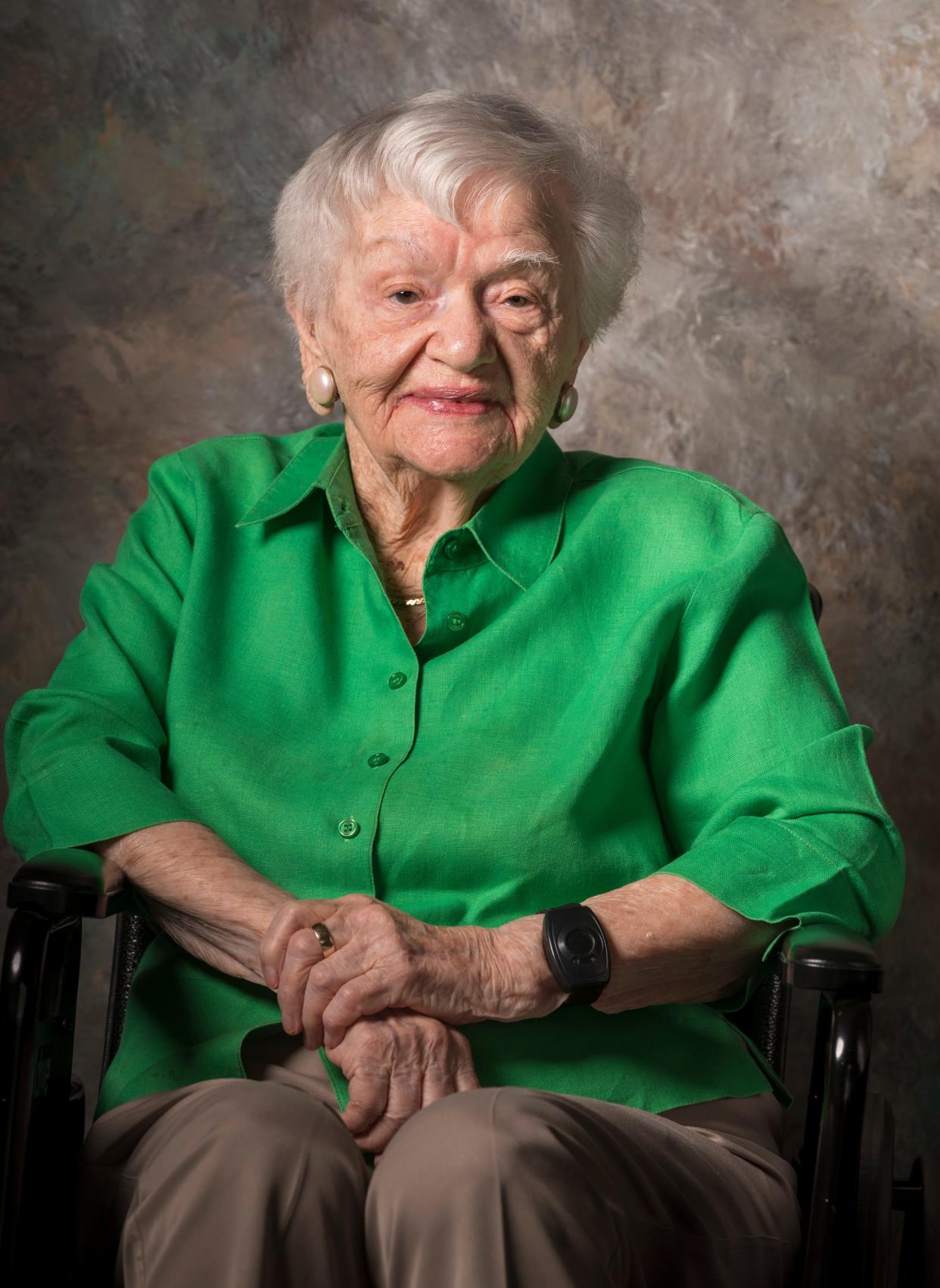‘She was not intended to have survived.’ Holocaust survivor, scholar Dr. Helen Fagin dies at 104

The community of Sarasota is mourning the loss of a local leader in human rights and antisemitism advocate Helen N. Fagin, a Holocaust survivor who passed away Sunday at the age of 104.
Fagin, a retired professor of English and director of Judaic Studies, was a Sarasota resident who spent many years in local schools sharing her life story and wisdom with local students.
"It is a big loss to everyone in the community," said Bette Zaret, Holocaust Education director at The Jewish Federation of Sarasota-Manatee.
New College of Florida re-dedication in Dr. Fagin's honor: New College re-dedicates Dr. Helen Fagin Holocaust, Genocide and Human Rights Collection
'This isn't entertainment': Holocaust survivor accepts painful duty
Fagin was born in Radomsko, Poland, in 1918. She came of age during World War II and endured devastating challenges during the war, including the death of her parents in Treblinka, a Nazi extermination camp. Fagin and two sisters escaped eventually and lived under false identities before arriving in the United States in 1946.
Survived by her children Judith and Gary, Fagin was married to her husband and children's father, sculptor Sidney Fagin, for nearly 70 years.
Her body of work as an educator, scholar, and antisemitism advocate spans her entire life. Fagin built a lasting legacy in Holocaust work, leaving behind numerous establishments on the study of Jewish history including the creation of the Holocaust Memorial at the University of Miami, the Helen N. Fagin Holocaust Museum, Genocide and Human Rights Collection at New College’s Jane Bancroft Cook Library, and her work at the Florida Holocaust Museum in St. Petersburg.
In a 2019 Herald-Tribune column then-New College President Donal O'Shea recalled Fagin's impact on the collage. "Beloved and utterly direct, Dr. Fagin has lectured and influenced independent study at New College for nearly a dozen years. In the commencement address she delivered to graduating seniors in May 2011, she told of standing out in a field with a group of other orphaned young people on a summer day in Austria in 1945: homeless, parentless and stateless. She described her dislocation upon realizing that she was not supposed to have been there at all — she was not intended to have survived — and the resolve that replaced it."
"She reminded students that each has within themselves a spiritual universe that is truly without limits and that no propaganda and no indoctrination should affect their sense of what is right and what is wrong," he wrote.
In a 2008 profile article in the Herald-Tribune, Fagin expressed amazement at people who would casually ask about the hunger, cold, constant terror and other early life experiences, saying she understood, but was still incredulous. "...For me these are not easy memories. Would you ask at the table of a woman who has lost a child what that experience was like? A man whose wife has been murdered -- would you ask him to talk about it over the dessert?"
For a long time, she said, she could barely talk about those years at all, and when she did before a synagogue or community group, "I would become physically ill, with pains in my stomach and in my throat."
One night, Elie Wiesel, whose memoir "Night" describes his own difficulties in bringing himself to talk about his own experience as a Holocaust survivor, was in the audience and later encouraged her to share her experiences.
"I remember that he put his hands on my shoulders and leaned very close, and said, 'Helen, if we do not talk about these things then we will leave it to others to describe from their imaginations,'" she said.
Fagin did so, and founded the Jewish Federation’s Holocaust Survivors’ Speakers Bureau. In 2021, she was awarded both a key to the city of Sarasota and the prestigious Jewish Federation of Sarasota-Manatee’s Zachor-Eisenhower award for bearing witness to the Holocaust.
"While it is important to learn about the Holocaust," she told the Herald-Tribune, "it is even more important that we learn from the Holocaust."
Those lessons included she said, that "educated, erudite individuals, thinkers" came to the conclusion "the final solution was perfectly plausible.
"And then they were able to enlist the help of chemists to devise an efficient gas for extermination, and architects to design an efficient death house, and industrialists to create the machinery of annihilation."
The lesson of the Holocaust is not that human beings are "somehow capable of resigning from their human obligations to one another," she said, but that "they do so out of conscious moral choice."
Zaret said that among the last words Fagin spoke to her, eloquently, articulately, "and with her usual brilliance," were that "together we must all continue to fight the good fight, to combat antisemitism and all expressions of hatred which have once again, raised their ugly heads.".
A funeral service was held Tuesday, with burial at Temple Beth Sholom Cemetery.
Samantha Gholar covers news for the Herald-Tribune and USA TODAY Network. Connect with her at sgholar@gannett.com or on Twitter: @samanthagweires.
This article originally appeared on Sarasota Herald-Tribune: Helen Fagin educated Sarasota for decades on Holocaust, antisemitism

